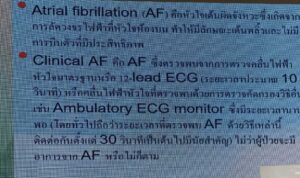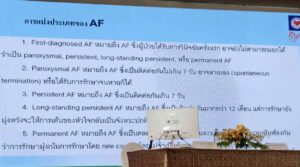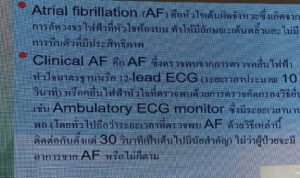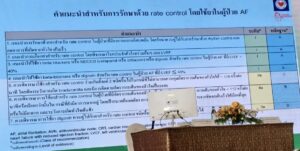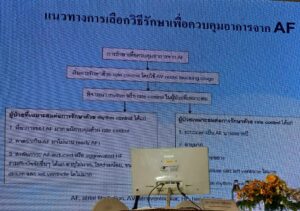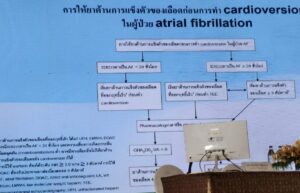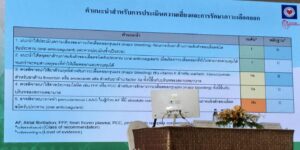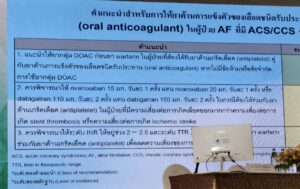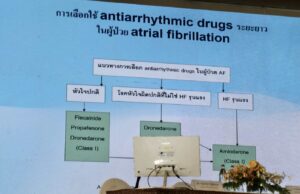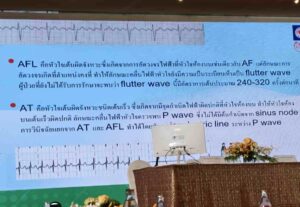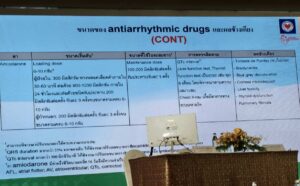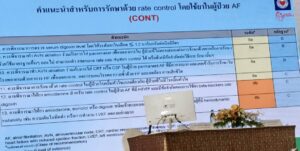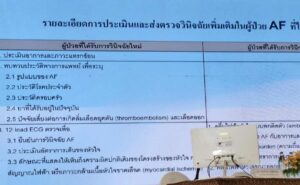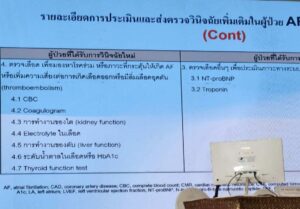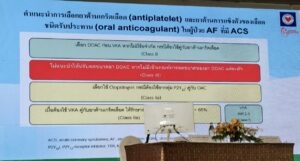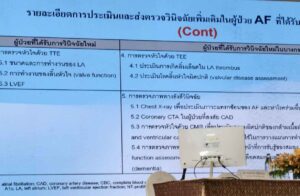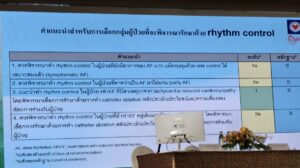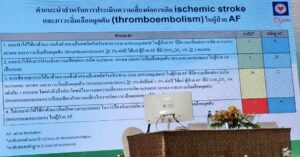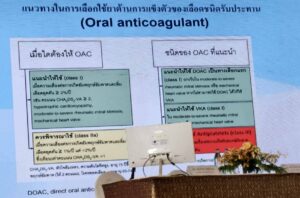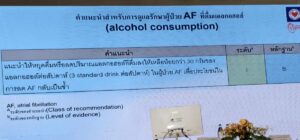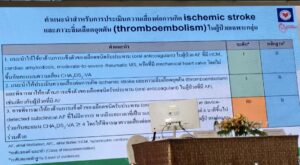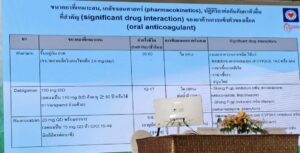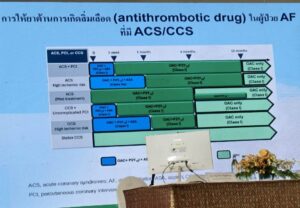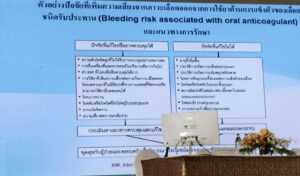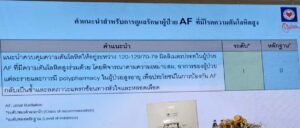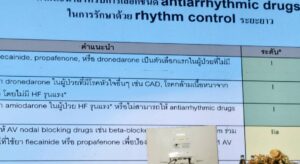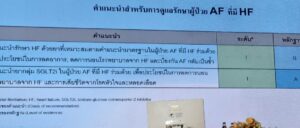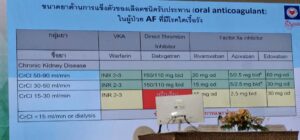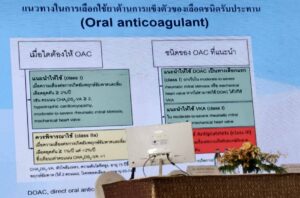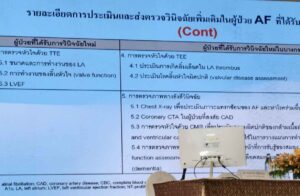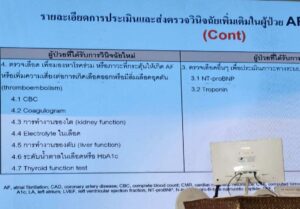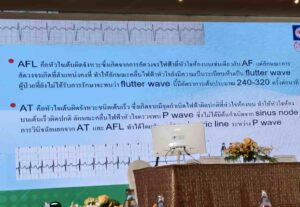ผมได้สรุปแนวปฏิบัติฉบับใหม่สำหรับผู้ป่วยภาวะหัวใจเต้นผิดจังหวะ (AF) ปี 2025 ของไทยเน้นที่การใช้ “3 ไม่” แทนที่การใช้ 3 อ. (ไม่เอาอัมพฤกษ์/อัมพาต, ไม่เอาอาการ และไม่เอาอ้วน) และใช้คะแนน CHAD2DS2-VA (ไม่ได้ใช้ CHA2DS2-VAsc เหมือนเมื่อ 2023) เพื่อประเมินความเสี่ยงโรคหลอดเลือดสมอง (stroke) และลิ่มเลือดในหัวใจห้องบน (SSE) โดยมีหลักการสำคัญคือ การให้ยาต้านลิ่มเลือดโดยตรง (DOAC) หากคะแนน CHA2DS2-VA ตั้งแต่ 2 คะแนนขึ้นไป และปรับปรุงวิธีการควบคุมอัตราการเต้นของหัวใจและจังหวะการเต้นของหัวใจให้เหมาะสม. จากงานประชุมราชวิทยาลัยอายุรแพทย์แห่งประเทศไทย ปี 2025 ในสไลด์ด้านล่างครับ
On 2023 Classification of AF: – At risk of AF (e.g., hypertension, diabetes, obesity) –
Pre-AF (e.g., premature atrial contractions, short runs of AF) –
AF (paroxysmal, persistent, long-standing persistent) –
Permanent AF (irreversible, despite treatment) –
CHA₂DS₂-VASc scoring for stroke risk: – Score 0: No antithrombotic therapy needed – Score 1: Antithrombotic therapy (preferably oral anticoagulation) – Score ≥2: Oral anticoagulation recommended –
Management focuses on: –
Risk factor modification (e.g., BP control, weight loss) –
Rate control (e.g., beta-blockers, non-dihydropyridine CCBs) –
Rhythm control (e.g., antiarrhythmic drugs, catheter ablation) –
New emphasis on early intervention to prevent progression Rationale: The 2023 Thai AF guideline adopts a staged approach to classify AF, emphasizing early intervention. Stroke risk is assessed using CHA₂DS₂-VASc, with clear recommendations for antithrombotic therapy. Management prioritizes risk factor control and tailored therapies.
New 2025 Thai Atrial Fibrillation Guideline (New) –
สรุปแนวปฏิบัติปี 2025 การปรับปรุงการประเมินความเสี่ยง:ใช้ CHA2DS2-VA score: เพื่อประเมินความเสี่ยงของโรคหลอดเลือดสมองและลิ่มเลือดในหัวใจห้องบน โดยตัดปัจจัยเรื่องเพศออกไป.การเลือกใช้ยาต้านลิ่มเลือด:ให้ DOAC: เมื่อคะแนน CHA2DS2-VA ตั้งแต่ 2 คะแนนขึ้นไป ยกเว้นกรณีที่มีภาวะลิ้นหัวใจผิดปกติแต่กำเนิด (moderate to severe rheumatic mitral stenosis) หรือลิ้นหัวใจเทียม (mechanical heart valve).การให้ Warfarin: สำหรับคนไทย แนะนำให้เริ่มยาที่ขนาด (2.5-3) มก./วัน และรักษา INR ให้อยู่ในช่วง (2-3).การควบคุมอัตราการเต้นของหัวใจ:เป้าหมาย: ควบคุมอัตราการเต้นของหัวใจให้อยู่ในช่วง (50-60) ถึง (<110) ครั้งต่อนาที.ยาที่ใช้: พิจารณาใช้ยา เช่น Beta-blocker, Amiodarone, Digoxin, หรือ Non-DHP CCB.การควบคุมจังหวะการเต้นของหัวใจ:ขั้นตอน: หากผู้ป่วยมีอาการหรือมีความเสี่ยงสูง อาจต้องควบคุมจังหวะการเต้นของหัวใจให้กลับสู่ปกติ (rhythm control).วิธีการ: อาจทำได้ทั้งการใช้ยา (เช่น Flecainide, Propafenone) หรือการจี้ด้วยคลื่นความถี่วิทยุ (Catheter ablation).แนวทางใหม่สำหรับผู้ป่วยที่มีภาวะไทรอยด์เป็นพิษ:Rate control: พิจารณาใช้ยา Beta-blocker ชนิดที่ไม่เลือกจับกับตัวรับ (Nonselective beta-blocker) เช่น Propranolol.Rhythm control: พิจารณาทำหลังจากภาวะไทรอยด์เป็นปกติ (euthyroid) แล้วประมาณ 4 เดือน (16 สัปดาห์).ยาต้านลิ่มเลือด: สามารถให้ DOAC ได้ และควรหลีกเลี่ยงการใช้ Amiodarone.
Thai guideline for the diagnosis and management of atrial fibrillation (AF) prepared by the Thai cardiac electrophysiology club under the Heart Association of Thailand under the Royal Patronage of H.M. the King. This clinical practice guideline is based on scientific evidence and expert recommendations regarding the management of AF. They serve as a guideline for physicians and healthcare professionals in Thailand, adapted to the local healthcare context to enhance the standard of AF care. The implementation of this guideline aims to reduce mortality rates, hospital admissions, and disability associated with AF.. Ngarmukos, Tachapong & Krittayaphong, Rungroj & Pumprueg, Satchana & Apiyasawat, Sirin & Boonyapisit, Warangkna & Rungpradubvong, Voravut & Makarawate, Pattarapong & M.D, Wanwarang & Suwanagool, Arisara & Wisaratapong, Treechada & Chintanavilas, Kumpol & Chantrarat, Thoranis & Methavigul, Komsing & Jiampo, Panyapat. (2025). 2025 Thai guideline for the diagnosis and management of atrial fibrillation. Thai guideline for the diagnosis and management of atrial fibrillation (AF) prepared by the Thai cardiac electrophysiology club under the Heart Association of Thailand under the Royal Patronage of H.M. the King. This clinical practice guideline is based on scientific evidence and expert recommendations regarding the management of AF. They serve as a guideline for physicians and healthcare professionals in Thailand, adapted to the local healthcare context to enhance the standard of AF care. The implementation of this guideline aims to reduce mortality rates, hospital admissions, and disability associated with AF.

Internist , Thai Board of Internal Medicine.
